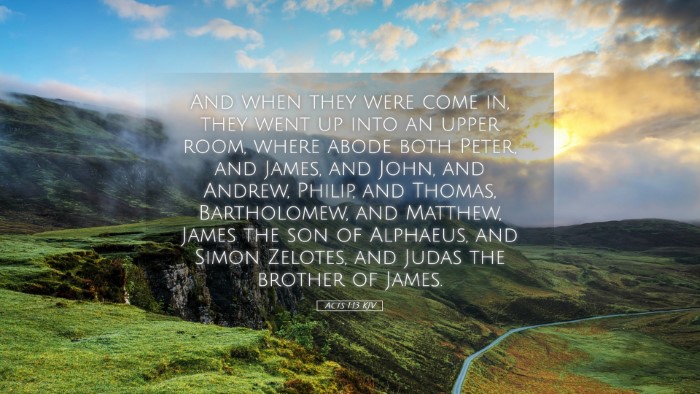Old Testament
Genesis Exodus Leviticus Numbers Deuteronomy Joshua Judges Ruth 1 Samuel 2 Samuel 1 Kings 2 Kings 1 Chronicles 2 Chronicles Ezra Nehemiah Esther Job Psalms Proverbs Ecclesiastes Song of Solomon Isaiah Jeremiah Lamentations Ezekiel Daniel Hosea Joel Amos Obadiah Jonah Micah Nahum Habakkuk Zephaniah Haggai Zechariah MalachiActs 1:13
Acts 1:13 KJV
And when they were come in, they went up into an upper room, where abode both Peter, and James, and John, and Andrew, Philip, and Thomas, Bartholomew, and Matthew, James the son of Alphaeus, and Simon Zelotes, and Judas the brother of James.
Acts 1:13 Bible Commentary
Commentary on Acts 1:13
Text of Acts 1:13 (KJV): "And when they were come in, they went up into an upper room, where abode both Peter, and James, and John, and Andrew, Philip, and Thomas, Bartholomew, and Matthew, James the son of Alphaeus, and Simon Zelotes, and Judas the brother of James."
Introduction
The verse under consideration, Acts 1:13, is pivotal in introducing the early Christian community that gathered after the ascension of Jesus Christ. It highlights not only the geographical location of the disciples but also their unity and purpose during a critical transitional phase in the nascent Church. In analyzing this passage, we will draw insights from public domain commentaries to deepen our understanding of its theological and historical significance.
Contextual Background
This event occurs in the aftermath of the resurrection and ascension of Christ, setting the stage for the coming of the Holy Spirit at Pentecost. The disciples, having witnessed the miraculous events surrounding Jesus, are now tasked with fulfilling His commission to spread the Gospel. They retreat to an upper room, indicating a time of prayer and preparation before the Holy Spirit empowers them.
Significance of the Upper Room
Albert Barnes notes that the "upper room" signifies a place of privacy and prayer, away from the public eye. It symbolizes a sanctuary where the early followers of Jesus could congregate to seek divine guidance.
The Company of Disciples
As Matthew Henry points out, the presence of key apostles such as Peter, James, and John emphasizes the leadership structure being formed within the emerging Church. Their gathering represents a moment of unity, preparing them to shoulder the responsibility of ministry.
The Apostolic Community
The verse lists eleven apostles, underscoring both their distinct roles and collective mission. Adam Clarke remarks on the diversity of the disciples, noting that they come from various backgrounds yet are united in faith. This diversity is essential in reflecting the universal message of the Gospel.
Names and Their Significance
- Peter: He is often recognized as the leader among the apostles.
- John: The beloved disciple, known for his deep theological insights.
- James: The brother of Jesus, symbolizing the Jewish roots of the faith.
- Thomas: His inclusion speaks to the theme of doubt and faith in the resurrection.
- Matthew: A former tax collector, representing transformation by grace.
The Theological Implications
In this passage, we see the transition from Jesus' earthly ministry to the era of the Church. This gathering symbolizes the continuation of Jesus' work on earth through His followers, empowered by the Holy Spirit.
Prayer and Preparation
The repetition of prayer in this upper room context is profound. Henry indicates that the early Church placed immense importance on prayer as a precondition for effective witness and ministry. Their reliance on prayer demonstrates humility and dependence on God.
Unity and Purpose
Barnes emphasizes the communal aspect of their gathering, which serves as a template for Christian fellowship. In their unity, the apostles exemplify the need for the Church to be united in purpose and mission—an essential practice for sustaining spiritual vitality and effectiveness in evangelism.
Spiritual Reflection
For pastors and theologians today, Acts 1:13 provides crucial insights about community life in the Church. It challenges contemporary congregations to evaluate their level of unity, the importance of prayer, and their commitment to the mission of spreading the Gospel.
Lessons for the Modern Church
- The importance of a dedicated space for prayer: Churches should establish areas that promote retreat and prayer, following the example of the apostles.
- The role of diverse leaders: Embracing diversity among church leaders fosters a holistic understanding of the Gospel.
- The power of unity: Churches should cultivate a sense of unity that allows the Holy Spirit to work freely among them.
Conclusion
Acts 1:13 is more than a mere historical account; it is a foundational moment for the Christian Church. Through careful reflection on this verse, believers can glean essential truths concerning leadership, community, and the necessity of prayer. As the early disciples prepared for the arrival of the Holy Spirit, so too must the contemporary Church prepare its hearts and minds for God’s work in the world.
By examining the insights offered by esteemed commentators like Henry, Barnes, and Clarke, pastors, students, and theologians can be inspired to lead vibrant, prayerful, and united communities of faith that reflect the mission entrusted to the apostles following Christ's ascension.


